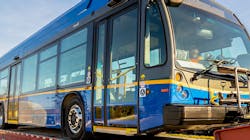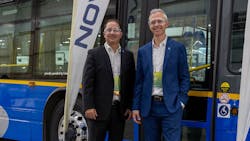First of 15 new TransLink battery-electric buses arrive in Metro Vancouver
The first of TransLink’s 15 new battery-electric buses have arrived in Metro Vancouver. Over the next few months, Nova Bus and Coast Mountain Bus Company will test the buses and prepare them for service, which is expected to start an early 2023.
Once all 15 are in service, it will fully electrify the 100 22nd Street/Marpole Loop route and quadruple the size of TransLink’s battery-electric bus fleet. This marks a leap forward in the agency’s journey towards net-zero greenhouse gas emissions and a more climate-resilient transit system by 2050 as part of the Climate Action Strategy.
TransLink’s long-term goal is to introduce 400 new battery-electric buses to its fleet by 2030 and to fully transition the fleet to zero-emission vehicles by 2040. Each battery-electric bus emits roughly 70 tonnes less GHG emissions annually compared to a diesel bus.
Earlier this year, TransLink tested a prototype of the bus, the Nova Bus LFSe+, to ensure its long-term effectiveness for Metro Vancouver.
Based on those tests, TransLink found the following information:
Distance
The Nova Bus LFSe+ is more flexible in how often it needs to charge. The bus can travel more than 150 kilometers (93.2 miles) on a single charge, even during winter months. The current battery-electric bus that’s in service from Nova can only travel about 40 kilometers (24.9 miles) on a single charge.
Charging
TransLink currently operates two charging stations located at the 22nd Street Station bus exchange and the Marple Loop. One is manufactured by ABB and the other by Siemens. These on-route overhead fast-charge stations ensure the buses can continuously recharge and operate throughout the day. The charging stations:
- Top up the battery-electric buses for the next trip in under six minutes
- Can charge buses while passenger's board
- Use an automated overhead mechanism that charges quickly through the bus roof

